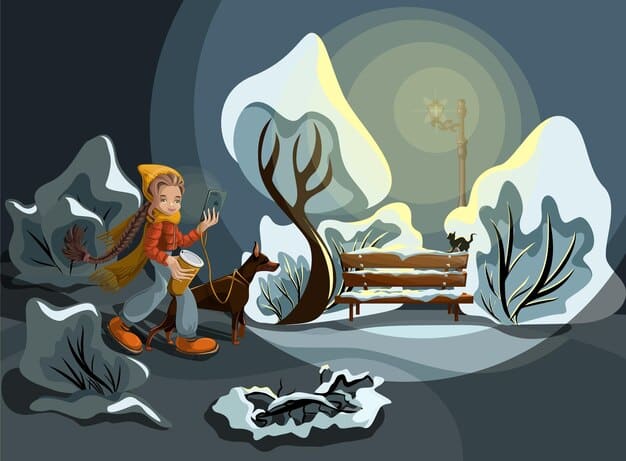Shonen Manga & Mental Health: Trauma, Resilience Explored

Shonen manga, geared towards young male audiences, intricately explores mental health themes, often depicting characters grappling with trauma and demonstrating remarkable resilience in the face of adversity.
Shonen manga and mental health: Exploring themes of trauma and resilience reveals how these action-packed narratives delve into the complexities of the human psyche. From overcoming personal tragedies to battling internal conflicts, these stories offer profound insights into the journey of recovery and self-discovery, resonating deeply with readers of all ages.
The Unexpected Depth of Shonen Manga
Shonen manga, traditionally known for its action-packed battles and adventurous storylines, often surprises readers with its nuanced exploration of deeper themes. Beyond the flashy superpowers and epic quests, these stories frequently delve into the characters’ emotional landscapes, revealing their vulnerabilities and struggles.
By examining the psychological challenges faced by shonen protagonists, it becomes evident that these narratives offer more than just entertainment. They provide a platform for discussing important mental health topics, fostering empathy, and promoting understanding among readers.
Challenging the “Ideal Hero”
Many shonen protagonists are not simply invincible heroes. They often start as flawed individuals grappling with personal demons, past traumas, or feelings of inadequacy. This subversion of the “ideal hero” archetype allows readers to connect with the characters on a deeper level.
These struggles make the characters’ triumphs even more meaningful. When a protagonist overcomes their inner demons and emerges stronger, it sends a powerful message of hope and resilience to the audience.
- Depicting characters with anxiety and self-doubt
- Exploring the impact of childhood trauma on personality development
- Highlighting the importance of vulnerability and emotional expression
- Demonstrating that strength comes in many forms, not just physical power
Shonen manga provides a valuable space for exploring the complexities of human emotions and experiences, offering a refreshing alternative to traditional superhero narratives that often prioritize physical prowess over emotional depth. The genre’s willingness to portray layered characters makes it highly engaging for a variety of audiences.
Trauma as a Catalyst for Growth
Trauma is a recurring theme in shonen manga, often serving as a catalyst for character development and growth. Many protagonists experience significant loss, betrayal, or abuse, which shapes their perspectives and motivations.
However, instead of succumbing to despair, they learn to cope with their trauma, find strength in their vulnerability, and ultimately use their experiences to become better versions of themselves.

The Many Faces of Trauma in Manga
The spectrum of trauma is a wide encompassing factor that creates engaging and identifiable storytelling. What makes a story engaging is that the viewers can either emphasize or learn something from the characters within the narrative.
Through the many faces of trauma, narratives that have it as a strong theme, can truly open up a viewers mind on how they interpret not only the story, but potentially some of their own thoughts, feelings, or ways of navigating life itself.
- Loss of loved ones and dealing with grief in a healthy manner
- Betrayal by trusted friends or mentors
- Physical and emotional abuse and methods to healthily express trauma
- Overcoming feelings of inadequacy and self-doubt
By showcasing the diverse ways in which trauma can manifest and be overcome, shonen manga challenges viewers to recognize patterns within themselves and offer potential healthy outlets to express those feelings that have been evoked by the narrative itself.
Resilience: Bouncing Back from Hardship
Resilience is arguably the most important theme in shonen manga. Despite facing countless obstacles and setbacks, protagonists consistently demonstrate an unwavering ability to bounce back from hardship and continue fighting for their goals.
This theme of grit and determination resonates with readers, inspiring them to persevere through their own challenges and never give up on their dreams, no matter how difficult the circumstances.
The Power of Friendship and Mentorship
Shonen manga often emphasizes the importance of social support in fostering resilience. Protagonists rarely overcome adversity alone; they rely on the love, friendship, and guidance of others to help them through difficult times.
Strong bonds and healthy relationship building, create a safe haven for charactes to express themselves and be able to lean on eachother when needed. It also creates a better narrative as the connections can elevate the stakes of the story being told.

- Forming strong bonds with teammates and allies
- Seeking guidance from mentors and trusted advisors
- Offering support and encouragement to others in need
- Learning to trust and rely on one another
The importance of relationships truly amplifies the sense of community, as the viewer can watch the narrative unfold whilst simultaneously feeling a sense of connection with the themes and how they are being portrayed.
The Role of “Nakama” (Friendship)
“Nakama,” a Japanese term for close friends or comrades, plays a crucial role in shonen manga. The bonds between nakama often transcend mere friendship, becoming a source of strength, support, and motivation for the characters.
These relationships provide a sense of belonging and purpose, helping characters to overcome their personal struggles and fight for something greater than themselves. Nakama are often a place where people can feel truly comfortable being themselves without fears of judgement or criticism.
Nakama as a Support System
Nakama are always there to lend a helping hand, offer encouragement, or provide a shoulder to cry on. This unwavering support system allows characters to navigate difficult situations and emerge stronger on the other side.
The support system is one of the major reasons why Nakama are such a tight knit, which is beneficial due to its potential to help overcome challenges.
- Providing emotional support and understanding
- Offering practical assistance and guidance
- Celebrating each other’s successes and milestones
- Standing up for one another in times of need
By emphasizing the power of nakama, shonen manga teaches viewers the importance of cultivating meaningful relationships and building strong support networks in their own lives.
Finding Meaning in Suffering
While shonen manga often explores dark and difficult themes, it ultimately offers a message of hope and optimism. Characters learn to find meaning in their suffering, using their experiences to grow, evolve, and make a positive impact on the world.
This message resonates with readers, reminding them that even in the face of adversity, it is possible to find purpose and create a better future.
Turning Pain into Power
Many shonen protagonists channel their pain and trauma into a driving force for good. They use their experiences to fuel their determination to protect others, fight for justice, and create a better world.
The pain that drives the protagonists helps to bring the viewer on a journey where they can learn to potentially find a way to deal with any personal difficulties they may be facing.
- Becoming advocates for social change
- Mentoring and guiding younger generations
- Creating art that inspires and uplifts others
- Dedicating their lives to helping those in need
By showcasing the transformative power of suffering, shonen manga empowers viewers to embrace their own vulnerabilities and use their pain to create positive change in their lives and communities.
How Shonen Manga Normalizes Mental Health Discussions
By openly addressing mental health issues, shonen manga plays a significant role in normalizing conversations about these topics. Through relatable characters and realistic portrayals of emotional struggles, these stories help to reduce stigma and encourage viewers to seek help when needed.
This increased awareness and understanding can lead to positive change in society, fostering a more empathetic and supportive environment for individuals struggling with mental health challenges.
Opening Doors to Dialogue
Shonen manga can serve as a gateway to discussions about mental health, sparking conversations with friends, family, and mental health professionals. By providing a shared reference point, these stories can make it easier to talk about difficult topics and seek help when needed.
Opening up talks can be difficult, but sometimes all it takes is a stepping stool to enter that phase of comfortability.”
- Providing a shared language for discussing emotions
- Normalizing the experience of seeking help for mental health issues
- Encouraging viewers to be more empathetic and understanding towards others
- Breaking down stigma and promoting open dialogue
As a result of the open dialogue, it allows for people from all walks of life to come together and build a space where people can comfortably express themselves without facing the possibility of marginalization.
| Key Point | Brief Description |
|---|---|
| 💪 Resilience | Protagonists display an unwavering ability to bounce back from hardship. |
| 🤝 Nakama (Friendship) | Bonds between comrades serve as a source of strength and support. |
| 🌱 Growth | Characters find meaning in their suffering, using experiences to evolve. |
| 🗣️ Dialogue | Manga normalizes mental health discussions, reducing stigma. |
Frequently Asked Questions
▼
Shonen manga is a genre of Japanese comics primarily aimed at a young male audience, typically featuring action, adventure, and themes of friendship and perseverance.
▼
Shonen manga often depicts trauma through character backstories, showing how loss, abuse, or betrayal impact their development and motivations throughout the narrative.
▼
Resilience is central because it showcases characters overcoming numerous obstacles, inspiring readers to persevere through challenges and never give up on their goals.
▼
Nakama, meaning close friends or comrades, forms a crucial support system, providing strength, motivation, and a sense of belonging, helping characters navigate difficult situations.
▼
It reduces stigma around mental health by normalizing discussions through relatable characters and realistic portrayals of emotional struggles, encouraging open dialogue and support.
Conclusion
In conclusion, shonen manga and mental health: Exploring themes of trauma and resilience highlight that these action-packed narratives offer more than just entertainment. They serve as insightful explorations of the human condition, providing valuable lessons on coping with trauma, building resilience, and finding meaning in suffering which makes them deeply resonate within wide array of audiences.





